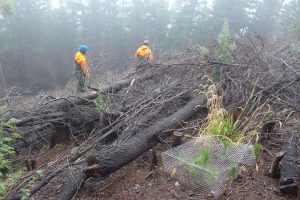A recent New Zealand study found that native plant regeneration under wilding contorta pine (Pinus contorta) forest was limited mainly by the availability of native seeds. The study was carried out by Kate McAlpine, Clayson Howell (Department of Conservation) and Debra Wotton (Moa’s Ark Research) in the Kaweka Forest Park, North Island. Contorta pine is a widespread and ecologically damaging invasive tree in the southern hemisphere. The study investigated whether the method of tree control (felling or poisoning), seed addition, and exclusion of introduced mammals using cages affected seedling establishment.

Felling contorta pine trees promoted establishment of contorta pine seedlings, whereas poisoning trees favoured establishment of native seedlings, but only when seeds were available. Native seedlings were largely absent from plots without seeds added (present in only 4% of plots, compared with 69% of plots with seeds added). Excluding introduced mammals increased the number of contorta pine seedlings but did not affect native seedling establishment.
These findings indicate that poisoning contorta pine is probably a better option than felling trees where native seedling establishment is desired, and sowing native seeds can significantly boost native plant regeneration.
The study was published in New Zealand Journal of Ecology and is available as a pdf.